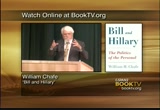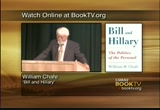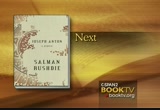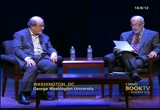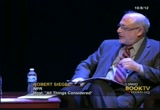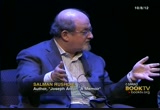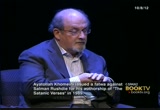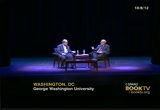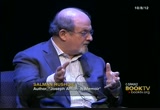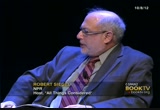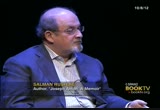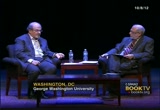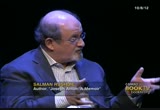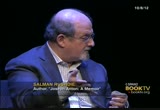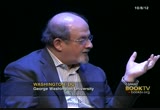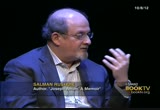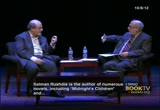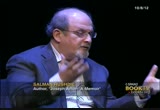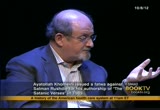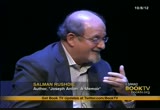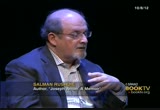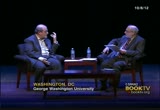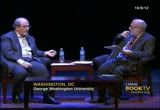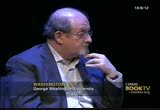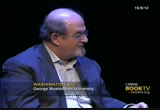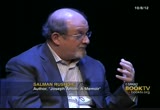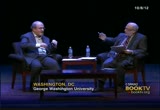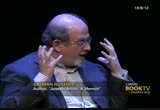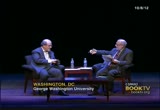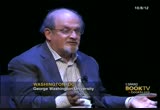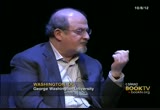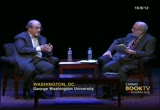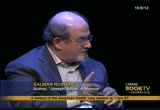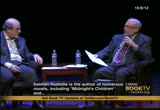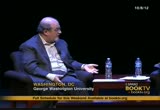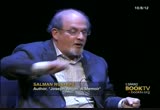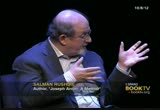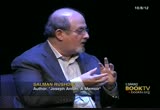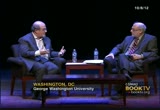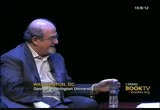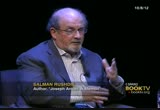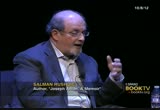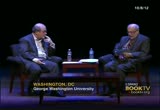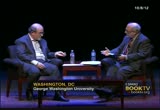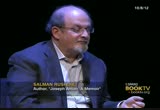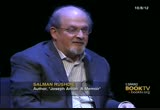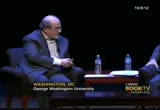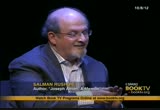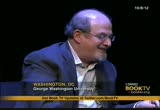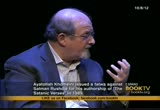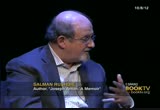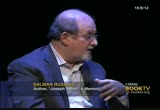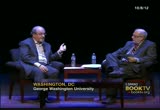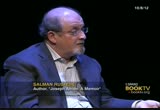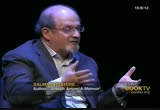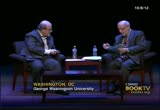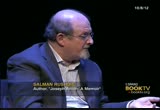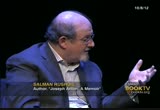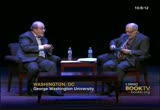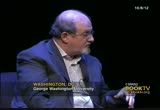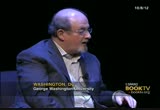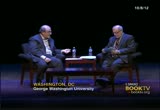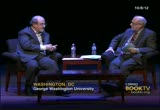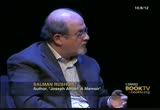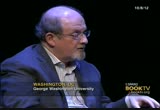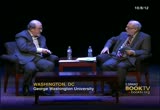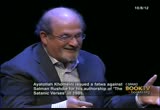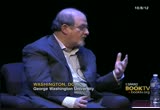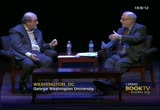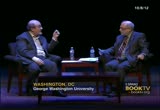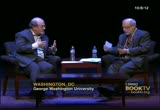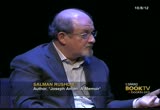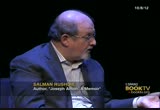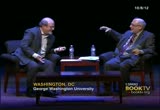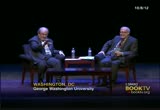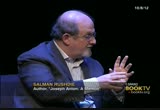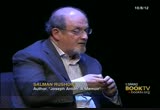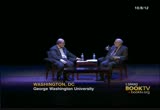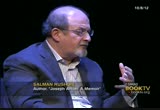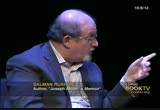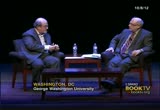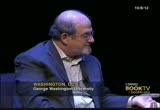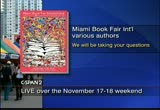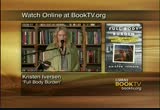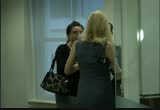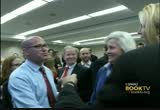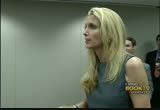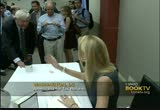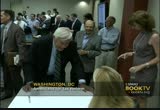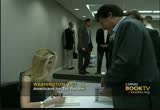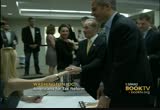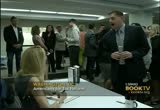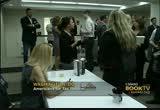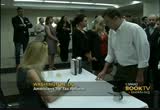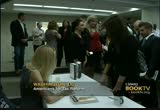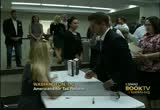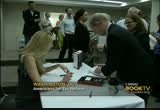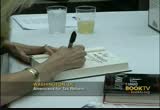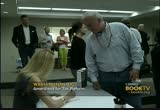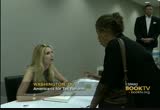tv Book TV CSPAN November 11, 2012 7:15am-9:00am EST
7:15 am
the sets out to be the person is going to risk -- is an incredible student. on of his class. he becomes very active in voice nation which is this junior american legion. gets nominated to go to washington as the boys nation, candidate for u.s. senate. goes to washington. is already six feet tall. he strives to the front of the line when they go to the white house to see president kennedy. and then when kennedy finishes his speech, bill clinton both forward and get his picture taken with, alongside a john f. kennedy. you so proud. he already is dedicated to the idea that he's going to be the person who's going to bring complete honor to his family. he already by the age of 17 has planned to be elected attorney general of arkansas, then governor of arkansas and as president of the united states. this is something which everyone
7:16 am
knows him knows about because he talks about it all the time. he does not go to the university of arkansas. he goes to georgetown. from georgetown he becomes the arkansas candidate and goes to oxford. he is an incredibly success everywhere but he cannot have a sustained ongoing relationship with a woman. he is attracted to the kind of women, his mother direction to what the beauty queens, who are the ones flirtatious, who are attractive, and that's really where his eyes have been. until he comes back to yale law school. there he meets hillary rodham. >> you can watch this and other programs online at booktv.org. >> in his memoir, "joseph anton," salman rushdie recounts the fatwa issued against him by ayatollah khomeini in 1989 for mr. rushdie's novel, "the satanic verses" which was deemed quote against islam, the prophet and the koran.
7:17 am
this is about an hour 20. >> thank you very much. thank you. no, and welcome to this evening's conversation with salman rushdie. i want to just begin at explaining that in march of 1992 i interviewed mr. rushdie for the first time. it was near dulles airport. i had to meet a stranger at a hotel bar who would take me to a secret location. i've known by the vacuous carrying a "wall street journal." and we had a lengthy interview, by my standards. and i went back today to read what tom rushdie said in an interview. and what i said introducing him. i realize that what i wrote 20 years ago is equally true today. is whatever. is one thing i like to say that rob salman rushdie, that his hero "midnight's children."
7:18 am
that book alone i would want to interview salman rushdie and would probably even go to somatic way hotels and and designated intermediary and then go somewhere else to do it. needless to say mr. rush is no longer famous for simply writing good novels. and this popularity is not the reason for such bizarre arrangements. he is famous because his later novel, "the satanic verses" was deemed blasphemous by the late ayatollah khamenei who issued a fatwa indenting salman rushdie did i. since then for the past three years he has been in hiding in britain mostly protected by the security police. so here is what you told me. in 1992, you said i really think that before this year is out, this thing will be over. [laughter] your pseudonymous alter ego joseph anton lived on for quite a while.
7:19 am
>> most of 10 years. >> just 10 years wrong. what was a lightning frustrated thinking this thing was about to get settled and you can work something out and then being dashed? >> i think back, the problem of how long with on with her difficult to write about, duration, very difficult to write about life. it wasn't that there were people shooting at me through the window. it wasn't dramatic pictures just the sense that we've been on and on and on which is what i use this image from argentinian writer talks about -- he says you can't take a photograph. if you take a photograph, it will look like a field. that's it. the only way you experience them is a traveling through them. then they just go on and on and on and on and on and on, and always the same, they go on and
7:20 am
on and they they are always the same and they go on and on and on and they are always the same. that's what it was like. it was like being in that situation, of a situation that just endlessly went on to. >> and during that time, you could not lose your own home. you lived in the company of the police. >> you. yeah, you know, a lot of people thought that i was in sort of isolation somewhere. but actually i was the opposite isolation. i was living with for enormous men with the guns. [laughter] and close friends. we became quite close, but it was, it was sometimes, the problem was not isolation but claustrophobia. >> and you managed to ride.
7:21 am
>> eventually up and down, yet. i mean, i think the thing that saved me actually was on the novel is. us the playwright, suppose "the satanic verses" have been a play or a movie, it played by movie director, it would've been virtually impossible for me to continue with my profession because of the difficulty of getting a play put on or a movie made. but writers are used to sitting in rooms and staring out the window wondering what the hell to do. [laughter] >> there you are. >> so in a way i was trained for this. [laughter] speed what you said about the image of the pompous, never knowing when it's over, it reminded me of a sensation in new york right after 9/11, with hindsight we can say it was a moment when we knew that have happened. but for a couple of days we didn't know. there could be another plane. one doesn't know when these things over. there's many ways in which we do
7:22 am
experience, seems to foreshadow things we all came to experience. >> that's what i very strongly came to feel, that what happened, the case of "the satanic verses" was a harbinger. it was a prologue some way. and i think that's one of the reasons why it was so often so badly understood. when it first time in the west went so badly understood is because we have no narrative to fit into the it seemed to come out of nowhere. is sort of strange medievalist attack. using accusations of things we hadn't heard about since the spanish inquisition. heresy, apostasy, these crimes. what the hell is this? and then it was easy for people than to thank well, we don't understand this because it's all
7:23 am
sort of weird and foreign, but he understands it, and so if he is upset the world so much he must've done something really bad. it was worth easy for people to do that because as i said they didn't have a larger frame. and what gradually happen over the next decade, the next 20 years was that people begin to understand the larger narrative. and, of course, 9/11 attacks, if you could say is the main event. >> let's talk about this idea that some of you are detractors i guess, one thing we learned is if we are ever targeted by a fatwa death sentence and we are a scientist safe houses, every perceived flaw in her character will be published in the media, if -- >> and not just laws and her character. flaws in our adherence. >> yes, everything. [laughter] speedwell, it was argued, look, you wrote daringly about an area where given this state of
7:24 am
leadership in islam in 1989, you were knocking on the door that was certainly possible, you pays your money, you take your chances. >> let's accept one of, seems to me one of the greatest things about the history of literature is that writers have always taken on, you know, writers have always in every country in the world taken on tyrants. the poem about stalin, he knew perfectly well from stalin was and what he was like. the history of literature is poets and artists, writers stepping out and telling the truth about tyrants to their face. it's one of the noble things about literature. to say that's what you must do
7:25 am
is to diminish i think what writers have done. >> we have a stake in the writer of fiction feeling defended -- >> shelley said that writers are the legislators of mankind, which may be putting it a bit high, but then he's a romantic poet. but i think it's not "speaking truth to power." that the business of saint i don't get who you are, but is a good thing spent when you were "speaking truth to power" in a very important way, it's the imagination of the artist being free to speak truth to power, and election wasn't going to defend on your getting the scoop. you weren't going to call out the government for its life. is something very different
7:26 am
spirit satanic verses was in a primary a novel about islam. it was, most of it was a novel about migration. about people coming from the indian subcontinent and settling in england in the 1980s. and consequences abound in the middle, there's a dream sequence, a dream sequence in which there's a profit not called mohammed inventing a religion not called islam in the city not called mecca. this is a dream and it's in a dream in the mind of someone going insane. this is what we in the trade call fiction. [laughter] [applause] that would be the technical term for it. but instead i wanted the strangest acquisition of all the strength of positions that was leveled against me, but from quarters of the islamic world. it was as if there was suspicion about fiction itself.
7:27 am
fiction was being proposed as being something which conceals the true motives of the writer. so whereas most of us who practice it think that fiction is a way of revealing truth, not conceding it. but anyway, i heard it a thousand times, people said he is hiding behind his fiction. >> your real agenda. >> yeah, my real agenda concealed in his fiendish make-believe, you know? i thought this is, this is really one way of describing, its people leading fiction as if it simply disguised fact. and so, for instance, in this dream sequence with this religion is being told and that our adversaries abusing the newly faithful, you know, and jeering at them, which happened, the early history of islam was
7:28 am
persecuted. so how do you do show persecution without showing the persecutors doing the persecuting? can't do it. and then if the things that persecutors say when they're persecuting the persecuting people, are accused, agreeing with them, but he means what they mean, suddenly you realize what they mean by disguising fact by fiction. it was the assumption that i was on the side of the -- >> if you could put those words on paper, clearly. >> clearly i must mean them. and so it was sort of a surrealist experience. i often think that the three, great trinity of 20 century writers who invented lecture is -- seems to me cost god is one
7:29 am
who got it most nearly right. but we live in, and one of the characteristics is at the same time that is being dark and scary, it's very funny. and i remember i used to say to my friends, often absent i think if this stuff was not funny at all, it would be quite funny. [laughter] i mean, for instance, quite soon after it all began there was this interview that i saw in british television with a rather sweet looking, elderly british muslim leader who had been one of the organizers of the demonstration but he had the silver beard, very neatly trimmed and so on. and soft voiced, gentle elderly bloke, you know?
7:30 am
and a tv interviewer said to him, had he read this entirely, he looked shocked. no. no, of course not. and the journalist interviewer said well, this is not mr. rushdie's first book. in fact, it is feasible. and. and he's written a number of newspaper articles and short stories and so on and so on. have you ever read anything that he has written? and this gent sweetly, with this kind of gestures, he said, you know, books are not my thing. [laughter] burning books, however -- >> burning books. we should get to this, you know, your global adversary or global pursuer at this was the ayatollah. but within britain, members of
7:31 am
the very immigrant ways you've been writing about, organized a book burning. people seemed at least comfortable with the idea of a vigilante death sentence against you, as a benefit of clergy. and some outright endorsements, he should die. this was a domestic british issue, and you at one point, this is i guess the point of greatest regret for you, you sat down with a group, and it's a very vivid scene you describe in a very special police station. >> the police station is for the maximum security police station that was basically built to enteric rate and house captured members of the ira. so it was built as a kind of terrorist holding station. and this was the place were i was told i would be allowed to
7:32 am
meet these people. the point is i was in a very bad state of mind. this was about two years into it, christmas 1990 when this was. christmas eve 1990. first of all, i was very worn down by the endless of the. that was only two years. also i was very worn down by this public rhetoric getting louder and louder in england. on the, partly from the conservative politician, partly from bits of coming in, the news media but also even from the public at large. there would be these opinion polls published in which substantial majority of british public were of the few this was my fault. it was up to me to do something to fix it. you broke it, you fix it. all this pressure really took its toll, and that's what sucked me into this meeting with these
7:33 am
islamic were these who claim they could sort it all out with just a meeting with them and make friends. and when i arrived, they showed me this very aptly typed piece of paper with spelling mistakes, grammatical errors, things that offend me. [laughter] [applause] >> you don't think this was the most clever way appealing to your vanity? spink i said look, you know, it's not grammatical. and they said no, no. , you can rewrite it. you are the writer. so yeah, i am. but the problem is in this text that they have constructed was what they consider to be the price of the ticket which was i had to make this declaration which was clearly absurd because no, i have less religion you can inscribe on it should offer
7:34 am
fingernail. -- chewed off fingernail. [applause] but, you know, weekly and shamefully i got, i got, i was just so desperate to break this logjam that i signed this document. and immediately i met these guys with doubts at the police station and taken away and the armored cars, i wish i realized, i felt like i'd ripped the tongue out of my own throat and i lost my language. and i like. flied. again, i was almost threw up in the back of the police car which, i'm glad i didn't because the windows didn't come down. [laughter] because they were all this fake. anyway, it was a bad moment for me because, like it's described in has been hitting bottom, and i think it was. but in retrospect, i came to
7:35 am
think of it as beneficial to me because i think it was a very clarifying moment. it showed me things that i hadn't looked at before, which is that there was no way of making everybody like me, you know, that there was nothing i could do. and that actually it was dangerous to try and make everybody like you because it meant, it sent you into a traffic and lead you into areas of compromise but things that should not be compromised about. and at that point got the hell with it. just the hell with it. no more appeasement, no more apology, no more a time, no more saying i am sorry. you know, blank back it. -- blan from that moment on in y out and have to fight. instead of come a just not me
7:36 am
just stand up for. just stand up for what you done and what you believe in and what's right and people don't like you, they don't like you. so although it was an awful moment for me, i mean, really sickening moment in my life, i think out of it came, out of it, but blunt, bluntly came the person that i was able to become. and so there we are. >> back to some of the difficulties living as she did, under protection which often merged on confinement, another 9/11 parallel for those who wonder if we give up much of our freedom in order to be secure and the threat of terrorism to you being told routinely, i don't think you'd be a loud to do that. you may not visit if your son can only come here under these particular -- you're being protected in the protection and great curtailment.
7:37 am
>> but also the truth is that every single other person in england who received police protection received by living in their own house. they didn't have to go underground in some way. they lived at home and uniform police protected the property and the special branch, secret police look after them when they went about their daily business. and they went about their daily business. there was no attempt to say you have to dispute the extent for me. i've often thought that i made a mistake. if i had it to do it again i might just say, you know what, i have a house over there. i'm going over if you want to protect me, that's where you'll find me. >> the best you could do was to
7:38 am
learn that somebody had credible information, there have actually been a fatwa somewhere. >> i did go, some, i got into some very strange places. i actually went into that building what you see in james bond movies, you know, which you detention is. [laughter] -- judy dench. at the head of the secret service. you, i met all these people. actually i came to admire them quite a lot. i thought they were really smart and really tough and really knew what they were talking about. and i thought, but it was quite good in a way to have them on my site. >> utopia 20 years ago, at a strange hotel near dulles airport that you found his give sophisticated and interesting, and you would give them what you write in the book and would blow the live off the secret police. there are a few moments in this book when you talk about the
7:39 am
ease with which someone whose life is entirely secret and goes off to undisclosed places to protect individuals they can't describe, it's the perfect cover for having extramarital affairs, when i was indulged by your account pretty often. >> [inaudible] [laughter] >> but yeah, it was going it's perfect color for fooling around. honey, i've got to go away on business. actually secret. i can tell you anything about it spent when i come back i'll have nothing to say spent i can tell you where i'm going and i can call you and i'll be away for eight days. >> some of your protectors did. >> yeah, they did. when you say some from it was i should probably all. [laughter] >> roughly all of them spent there was one i can tell you about because he got phone out in the photo.
7:40 am
one of the cars was with me for a while was a bigamist. he had two families, two wives, two sets of children, and yet taken the precaution of giving both wise and sets of children the same loving the names. [laughter] >> so there's no -- >> so he could never make a mistake. whenever he went, he called him whatever he called them. he only got caught because he was not -- he was just getting, they caught him because he was broke. but otherwise he was caught. >> in addition to the real-life building where the fictional character works, you had a surgery at one point. you needed a medical treatment. >> i had a problem with my eyelids, which is a medical problem, a condition called doses were basically and how
7:41 am
much do want to know about this speaks well, you needed surgery. you can say just begins with a p. >> the muscles that were to eyelids stop working properly. so i had to have disappeared. and went to this hospital and been ever since, it was an and operation of my eyes is only my eyelids but nevertheless i was in his place with my head bandaged and came out of the surgery in the middle of the night. and said hello? nobody answered. i said hello again, and nobody answered. and i thought, what? which i didn't know where i was, et cetera. i mean, that happened, the moment a picture emerged out of an assiduous the moment the nightmares had gone to the bathroom. -- night nurse had gone to the bathroom. it was just a minute or two
7:42 am
minutes, but to me, blindfolded and not know where you are and not even now what condition your eyes are in, it was a moment. >> and in a very special hospital, i gathered. >> everything i did was in some kind of maximum-security place where, you know, the royal family -- >> would have their surgery. >> don't ask what the royal surgery are. you don't want to know. >> this is a memoir, and it's not just the story of you and trying to get "the satanic verses" published in paperback was a struggle. it's also about your life. at the beginning of this saga you had one wife and one ex-wife. by the end of it you had for ex-wife, one of whom deceased by the the end of the story. at the beginning you had one
7:43 am
young son. by the end of it, a young adult and you have another son. i mean, you were living, to put a mildly, and active lives even under, within this shell of protection that you are having. >> there's this moment, 1990 somewhere where i was interviewed by mike wallace for "60 minutes." he came to whatever undisclosed location, and at that point it had become known that i'd broken up with my then wife, marianne. select the second question, "60 minutes," the second question he asked is, so your marriage ended. i said yes. he said what do you do about sex? >> that's a very highly rated program, "60 minutes." [laughter] >> i thought this is the most
7:44 am
important political show in american television, second question is about talking someone? [laughter] spent as it happened, i had been very great fortune met elizabeth hood became my wife, and i wasn't going to tell mike wallace about. it was one of those magic moments when the right words just dropped into my mind. and i said well, mike, to show you the truth i'm really grateful for the rest of. [laughter] [applause] >> and he looked so shocked. [laughter] that i had to say something like just kidding. anyway, that's mike wallace and me. >> in addition to your family life changing quite a bit over this time, during that time he wrote "the ground beneath her
7:45 am
feet," -- >> the first one i wrote a collection of stories, east, west. you know, i wrote, i did my job. as i said, i really think that the fact that i was able to do my job by just sitting in a room and writing was an enormous part of what saved my life. i could be myself. >> i was trying to figure out whether i thought, how much your writing was influenced by the experience, and it seems to me celebrating in memory of spain and the moment great cultural cooperation between islam, christianity and judaism was that -- >> what the book really came out of was something else. what was going in india at that
7:46 am
time was not an islamic buddy in the. one important aspect of that was to raise the issue of authenticity. what was an authentic indian, anti-odds was only the hand experience of india was authentically indian. and what that meant was all the minorities was the largest minority among the minority. were in some way an authentic. i found that very annoying. and so i thought i would take a very small minority, which is a south indian jewish community. and then create an even smaller minority by having somebody from that community mary into a south indian catholic family, thus creating a catholic-a jewish
7:47 am
individuals probably a minority of one person in a country of a billion people. and then show that you could actually grow the whole experience of india out of that one person. you know, so that everybody in indian is authentically indian. that's what it wanted to say. and not just any particular devotional group. [applause] >> i mean, the novel came out of that desire to rescue what it was to an indian from the logic of this kind of attack. >> you talked earlier about literature and the role of the writer, the fiction writer. and at the end of the book there's actually a wonderful, you write and talk about important purposes of fiction.
7:48 am
this raises a question, well, i came up in kind of a public dispute you had with john at one point in the pages of the regarding which is is a freedom of expression of the domain of the literary artist, or his phrase, the first of rights pope, at the same freedom of expression. given the experience recently to broaden that to the completely artless trashiest video the rights and may even be calculated, do all have the same speak was-- >> is not only for artists, it's also for garbage makers. like, whatever his name is. i don't even knows what his name is. [laughter] but it's often the case when you're fighting this free speech
7:49 am
are committed to find a self defending stuff you don't like. there's an episode in the book something is happening to me which is there was this filmmaker in the early 90s called international guerrillas, which was about a group of what might now call al qaeda terrorists, whose job was to find and kill me. and when they did so that would be the happy ending. now, the character than the character was shown living in what looked like an island in the philippines. >> protected by israeli soldiers. >> protected by the israeli secret service. all in happy homes. and at one point, remember, there was, one of the international guerrillas gets captured by the israeli secret service and gets abroad, the me character is depicted as having a bottle of jack daniels and i'm switching away like i. the other half, either a web
7:50 am
with which he sleeps his i do lust on people because that's the kind of person i am. anyway, so the member, the heroic international guerrillas is tied up between a couple of palm trees like this, and i'm there to torture him. then i have a better idea. and i say to the israeli secret service, i said taking away and read to him from "the satanic verses" all night. [laughter] and, of course, the totally cracks. [laughter] jinnah, everything but that. stuck at pakistani movie. >> which is usually defamatory. i do get killed but i don't get killed by then i get killed by flying carranza issuing bolts of lightning. [laughter] spent partially fried by the almighty. i thought there is dignity in the. anyway, the film is refused in
7:51 am
england because it is defamatory and because they are told if they give it a certificate i can sue them, too. for detaining me. so i have, i decided i can do the trick i'm fighting a free speech battle but i can't be defended by an act of censorship. so i have to write to the british board of film certification informally give up my rights of legal abuse but i'm not going to see. so don't not to give it a certificate on my account. so they did. it open in the biggest cinema in bradford, which is the largest muslim population in england but that's what they did the book burning. anyway, nobody went. [laughter] why? because it's a really crappy movie. [laughter] and whether or not people like me or not they didn't want to hand over the money to go and see a really bad film. and i thought it was a great
7:52 am
little microcosm of the argument for free speech in which is if you have bands that film, it would have acquired acclimated to would have acquired objects and people would've been watching videos behind drawn curtains, et cetera. you put it out there, it disintegrates. >> i suppose the proper peril, if he knew that all of the novelists in britain rise up and ride once this came up and if he knew that 10 international would order a death sentence to the filmmaker, one can begin to understand the sensors interest in keeping this. >> the idea of writing novelists, you know, it speeded i just put that he is kind a conventional -- a fictional conceit. >> that's begun, that stretches it. look, here's the thing. it seems to me we can't come we should try and not live in a
7:53 am
world in which the threat of violence is what determines what we can say and not say. otherwise we're getting in to -- [applause] >> i mean, i think this is a lesson we learned in school playground. if you give into a bully, you insured that there will be more bowling, not that there will be less. there will be more. and the only away that you diffuse bullying is to stand up to the bullies. and i think, no, we notice when their kids. we should remember it we are adults. [applause] >> having -- >> i still imagine it. >> smashing windows. having to include out of questions i'm going to turn to the questions that the audience
7:54 am
has submitted and put them to you. several of them in with the why do you kill it is now safe to do this to her? >> well, because i'm in doing this kind of thing for 11 years now. and so far you won't seem not that dangerous. [laughter] >> those days there were still a lot of secured. know, 2002 really, march 2002 is the last moment in which there actually was a security presence in my life, and then since then, i've been on the lecture circuit. i've been teaching and speaking at universities. you know, going on "the jon stewart show." it doesn't seem that dangerous. [laughter] now. i mean, the thing to explain to you is that the real danger to not just my life but to all those, remember the transfer also named anybody who was involved in the book at all.
7:55 am
so it included publishers, translators, booksellers, et cetera. the real danger was never from like random violent individuals. the danger was always state-sponsored terrorists is the it was a paid professional assassins of the outlining state and its proxy to that's where the danger was. >> and there were some attacks. >> there were, a number of effects from yes to attacks and bookstores. there were bookstores in america like cody's bookstore in berkeley, california, was firebombed. at a bookstore in london that was firebombed toys. bookstores all over the world that were attacked, not just burn but actually people going into bookstores and threatening people working there. and in publishing companies and then, well, the great tragedy was the books, the japanese translator, was murdered at his
7:56 am
university in japan. and there was intent to murder and norwegian publisher and the italian translator of the book, for both fortunately survived. but this was a shooting war. and the point is that in all these cases, the evidence that emerged showed that these were professional hits. >> this was not spontaneous. >> no, no. these were professional hits. and so basically the danger was very high. until this moment in around the turn-of-the-century, when we finally managed to get the iranians to back down. and at the point at which we are convinced certain that the action had stood down these gangs of killers, really most of the danger went away. >> dr. hatchett and to this next question. what is the difference between
7:57 am
the fatwa and the recently announced bounty on you? how do you deal with? >> about his been all the time but the fact is that, nobody has ever taken these old gentleman seriously. because it's pretty clear he doesn't have the money. [laughter] you know, anybody can stand up and say, $3 million. and if you don't have $3 million, it reduces your argument. know, this is, what's happened to me in this decade since the spring of 2000 is that every so often someone in iran stands up and sort of waved at this to my direction and says something rude. the difference is between this war of rhetoric and the actual very dangerous situation of professional hit squads. >> and historically in iran, the people who are okay with the fatwa include former reformist
7:58 am
president of iran, the man who some people think won the election and the stone from him. >> yes, all of them. that's when the proms and iran is even the liberals are households. [laughter] >> a novelist and education. i can't indulge that from my line of work. is a question. [laughter] >> now for something completely different. [laughter] >> in your opinion, what would you say is the most crucial element, whether literary or structural or moralistic, two in engaging story? >> i can -- when i wrote a few stores is that my son failed to do. when i had written about three '04 pages, i want to make sure it is going all right. so i showed to him and he
7:59 am
rented. and when i talk to them that i could see that there was just some little cloud on his face. and i said, well, do you like it? he said oh, yeah, i like it, debt. i said, so, what are you not saying? he said well, dad, some people might be bored. [laughter] and i said, he said not me of course. i would read it. [laughter] some people. and i was shocked and displeased. and i said, board? y. boorda? what do you mean, board? why? and he said this wonderful thing. he said you see dead come it doesn't have enough job. it doesn't have enough junk in it. i understood exactly what he meant. i can do jump.
8:00 am
grabbed it back from him, went away and rewrote it with extra jump. and then get back to him and i said now through gritted teeth, what do you think of it now? [laughter] and he said now it's fine. and it was the best, most precise literary criticism i ever had it because he was actually hopeful. the secret ingredient for writing, not exactly children for young adults, is jump. if you jump, the rest of it is okay. asked j. k. rowling. she has jump. [laughter] >> can you tell your favorite story about your very good friend, the late christopher hitchens? >> oh, it's kind of very, it's actually very strange for me still to come to washington and and have him not here.
8:01 am
because every time i was coming i would stay with them. it's a big hole in the world. we used to play all these games. i invented the clean ones and martin invented the dirty ones. >> you are the sanitized version. >> the clean one was, well, different games. we have bob dylan quotation marathons. i would try and recite them all and he would try to siphon -- resides within. he had the most amazing memories we always one. we invented this game about titles of things it didn't quite make it. so, you know, farewell to weapons. [laughter] in mr. zhivago.
8:02 am
today's in the life of -- [inaudible]. you know, for whom the bell rings. [laughter] there were lots of these -- toby did. also known as moby prick. [laughter] oh, blueberry thin. [laughter] anyway, then martin and he invented hysterical sex. hysterical sex game is where you replace the word love in a ton of things with the phrase hysterical sex. so this gives you hysterical socks at the time of cholera. [laughter] >> you know, all you need is hysterical sex. hysterical sex's is a many splintered things. expected that make it into the book? i don't think so.
8:03 am
>> to you and hitchens talk about becoming american? about becoming, seven in this country? spent ages was attacked. but the thing that happened with christopher which is what i should say, is that in 1989 at the prime of the fatwa were friendly but we were not close friends. he lived in d.c., i was living in london. we are lots of friends in common. we saw each other when we could but he wasn't like one of my bosom buddies at that time. when this happened, to me, he was beyond to say -- i think became a very profound event in his life and he just took the decision to come and stand right next to me and be one of my closest friends. he became my friend because of this. and then, of course, became one
8:04 am
of the most wonderful allies anybody could have. christopher is a fighter. and if you're in a fight you want them on your site. you wouldn't want him on the other side. so it became, our french it became closer and closer in those years as he wanted it to be because he wanted to make that statement. and i thought that was extraordinary of him. i mean, when i came here to d.c. to go have when it was arranged for me to have a meeting with clinton, i actually went to the white house from christopher's apartment, and he had been quite helpful in pressurizing some of the people he knew in the clinton administration like george stephanopoulos, for example, to try to get a meeting to happen. and christopher was no great fan of president clinton, to put it
8:05 am
mildly, hated his guts. but thought it would be valuable if i could meet him and in fact george stephanopoulos was so excited when meeting finally happened that he called christopher from the white house what i was having a meeting with clinton said to christopher, the eagle has landed. [laughter] is the only time i think i had anything in common with neil armstrong. it was just like landing on the moon. one small step, et cetera. but it was an important meeting because the previous american administration, george bush senior administration, had been very dismissive and uninterested in this matter. and suddenly to have the american government, then, putting the power of the united states behind this, first of all different and a lot of other european, a lot of other western
8:06 am
european government. and i think it got attention of the armies and detention, and initiatives of the new labour government in england finally brought the thing to an end. so it was a big turning point. >> in fairness, we should say that when a reason was given to you for why people would not stand up, always involve hostages had been held in iran. you in the hopper some way -- >> actually, there were american hostage in lebanon. initially i was asked by the u.s. authorities not to visit the united states. while there were hostages in lebanon because they were negotiations to get them out and they didn't want to endanger them. and to be fair, the day that the last american hostage was freed and brought to safety, the american said to me there was no longer a problem, i could come whenever one appeared so they
8:07 am
kept their word. this is the thing about meeting strange people. there's an official who does the job now, there's an official in, well, probably in washington who was the u.s. counterterrorism chief. there's an official who holds the rank of ambassador, but the job is so secret that while he's doing the job you can't say his name. you can't say what he lives and you can't describe any of his movements. and yet he runs the whole counterterrorism operation of the united states. and i met three of them. these invisible man. i me, i could write one hell of a spy novel. [laughter] but anyway, it was one of them put asked me not to visit the united states, but it was another of them who said okay, i could come. and i actually was able to come the first time i came here, not
8:08 am
here, new york, was to speak at columbia. there was an event celebrating. this was one of those funny although not funny moments because i was met at the airport by 11 vehicle motorcade, with at the of it and armored white stretch limousine. it was like having a huge finger in the sky. [laughter] keys here. -- he is here. and there was a police officer in charge of this operation, in the book i call him lieutenant. i said lieutenant bob, this is a lot. i said wouldn't it be better just to put me in a secondhand buick and driving through the back streets of queens? and he looked at me, and he said, no, sir it would not be better.
8:09 am
and i said, well, who else would you do this for? and he said, sir, it's what we do for yasser arafat. [laughter] so suddenly i was the head of the plo, you know? >> like a level of treatment. >> yeah. so i said just because of trees, i said well, if you are protecting the president, what more would you do? it already looks like a colossal event. and he said well, sir, if you were the president, these united states, sir, we would close down beside was and what it meant up on the building and brewpub have helicopters of the in your case will didn't do that because it would look too conspicuous. [laughter] spent a very good by the way. good americans. one of our guests, one of our guests in the audience ask, did you believe at some point, i
8:10 am
guess from your story that point would have been in the armored car heading to the police station did you ever believe at some point it was not worth writing "the satanic verses"? >> no. i thought it was more a less not worth living. i mean, look, the thing about, i'm very proud of the acting is one of the better books i've written. [applause] >> and i think also one of the reasons i've gone through this and thought this fight is so we can reach this moment now, now that the fatwa has died down people can finally read it just as a novel. i'm thinking especially of younger readers. if you like 30 or under now, then you would have been five or six or less, you know, when this happened and it's ancient history. so i think younger readers can come to the book sort of caring less baggage if you like. they can just pick it up and
8:11 am
read it. that's beginning to happen. and so now i find some people love and some people can't stand and some people think it's bad but -- >> it's no longer the issue of a man's life is at stake spent it's finally having the ordinary life of a book. i'm happy for it, and here's the other thing i really think is important to say. the books survive, if they survive because people like them. not because people don't like them. it's a scandal. we don't care about the literary scandals of 100 years ago, 200 years ago. any book that survives any length of time, it survives because people think it's valuable. and any book that stayed in print 100 years has stayed in print because people love it. not because people don't like it. and so now finally this book has its chance to see if it's going to pass that test.
8:12 am
i mean, i won't be around but at least -- i like it, because i've been around a long time, more than 30 years old. people still seem to think it's worth reading. and so, i mean, there's people, you know, who were not born when the book came out to read and. that's like leaving the first hurdle going into the next generation. if you can do three, four more of those then you got a chance of sticking around. >> i was thinking about this, and reading "joseph anton" out of some point there would be literature professors who will assign this book and have to explain the huge hoopla that surrounded. this may not be -- here's how this book figured in the history of the world circa spent now they can read his other book
8:13 am
which explains -- >> there you are. >> one of the things i really feel is that, for a long, didn't really want to talk about all this stuff because if i would write a novel and i would, on a book tour to talk about my novel, inevitably somebody would want to ask me about the fatwa and all that and i would get frustrated because i would think under to talk about this now. superlong, i resisted talking about. so now it's rather oddly i'm doing nothing but talking about it. but also think it's a way i hope, a draw -- a way of drawing a line under a. because in future if i'm here to talk about a novel and some asks me about the fatwa, i'm just going to throw a 600 page book at them. [laughter] spent here, go read. >> and that feels, just as good to have it out in the open. and one of the things that feels good, we were saying before we came out, all these people helped me. so many people helped me come and help me in the most
8:14 am
extraordinary way. sometimes lewd early moving out of their own home so i could live in them because i needed to. and none of us has ever told our stores but it's been two decades and with all capped a secret. and this is, this is the literary world. this is the world they can't keep a secret to save its life. >> these are the people who all have -- >> exactly. but to say my life, everybody sent to their lips and didn't say one word. >> you actually extended that for the. you say that when all this was over, you conclude, one of the reasons your secret has been well kept is that the workmen who worked on the house, people actually know it was salman rushdie and they didn't talk. neighbors suspected and they didn't do. >> everybody just thought this is really serious, don't screw up. you know, and everybody liked
8:15 am
focused. and it was an extraordinary -- i've often thought, i think more and more really that yes, there was this kind of hatred level at me and i will work, et cetera, but there's also this collective act of solitary mountain. what happened was a battle between love and hate. and the reason that i news because let's be corny, because of the power of love. which actor proved itself to be stronger. [applause] >> here's a question which may, if i'm using the idiom directly, begs the question, with the rise of islam extremism out of russian society maintain an unbiased and respectable view of the religion? >> i wouldn't recommend it.
8:16 am
[laughter] [applause] [laughter] >> i do want to ask a follow-up? [laughter] >> i mean, that's the hitchens answer. >> which is make a cartoon instead. since, not just millions, hundreds of millions, millions of people believe devoutly in faiths which are fundamentally incompatible with one another. would not believe all of the revelations that have been received. it can be argued that one way that we keep the peace very broadly is is to live in separate countries and never migrate from one to another. or to just not go to certain places. i mean, intellectually, not raise certain topics. not to place a certain rigor to someone else's faith that we would to their clothing, let's
8:17 am
say. >> that's chicken, isn't it? >> it is a chicken but i'm offering it is the same. to be polite, in other words,. >> democracy is not a polite thing, had you noticed? imai, one of the things about living in genuinely open society is that people disagree violently all the time. when i say violently, i don't mean violently. i mean, they disagree. but the nature of democracy is disagreements. and very often that disagreement is extreme and very often as lucy in this country today, it's very hard to see what common ground is doing people a month and people on the other. we have a very divided nation. but i've come to believe that the argument itself is freedom. you don't have to resolve the argument the you just have to be able to have it. and in every country which is not a free society, the argument is shut down.
8:18 am
somebody says you can't talk about that. or worse, we will tell you how to talk about that, and you don't use the official we're talking about that, we will come after you and get you. >> seems to be functioning democracies. there can be limits on some kind of hate speech and things ago forgot our standard. >> in england where he lived a long time, there are greater limits. for instance, there's a thing called the race relations act which makes it illegal to make racist remarks. whereas here, the first amendment would actually defend, protect the ku klux klan or whoever making its various bio remarks. you could argue both ways, but the view i've come to have used
8:19 am
that the first amendment is a better way to go because bigotry, dreadful ideas, do not disappear if you prevent the and rent. and those that is sometimes increase in power if you ban them and forced them underground. and it's better to have been out in the light of day, you know, vampires die in sunlight. >> don't you have to drive a stake through -- >> you don't even have to. >> is easier than i thought. [laughter] spent it's just let the light shine in. >> one of our members of the audience asks, in the age of social media and internet, well, do you think the muslim world is in the crossroads? how easy it is for anyone to whip them into a frenzy? or how different would this laid out in the age of the internet? >> i think would've been much more dangerous. i mean, in those days, the
8:20 am
fastest medication device that existed was the fax machine. if you remember -- [laughter] >> fax machine. and your telephones which had court that connected into the wall. and that wasn't. i remember, this funny scene in the book where, i was allowed to give out phone number to people, to do. i had a friend who worked in the computer business and he said that are the things now called mobile phones, and maybe you could have one. and then people could call you and they wouldn't know where you were. how innocent ideas. [laughter] and i say o god, that sounds fantastic. and he said i've got to go look into it. a while later he brought me this object that was like --
8:21 am
[laughter] you needed a little bag to carry it around. this huge brick, but it was like magic. it wasn't connected to anything, and i could push buttons and people would be there. you have no idea what it felt like. it felt magical because suddenly i could get out of phone number. no, i think if the internet had existed and everything else, you know, text messaging, facebook, twitter, all that, it would've been so rapid, the spread of the attack would've been instantaneous. >> what about the finish, about how to get publishing houses behind the paperback edition what people were afraid of what would happen, and if someone had come to did and said we have a secret origin on line? >> that would be easy. certainly the invention of digital books would have solved
8:22 am
the problem. because the reason why there was such a fight about the paperback, the reason why i was so anxious that they should be a paperback is that we all knew that if you want to keep a book in print over any length of time, you have to have a cheap edition. you can't have the original hardcover edition, because no matter how popular the book is, there will be a moment at which people stop buying the expensive hardcover edition. and if you don't have a cheap edition the book will go out of print. and since we've got to fight for the right for this book to stay in print we needed a cheap edition. that was the argument i was using with penguin books and sadly there were unable to support so we had to eventually do it another way. now yes, you could have an e-book and it would achieve the same end. >> during that whole argument you end up, the argument that hadn't you, point is taking them
8:23 am
the book is published, now this will all go away. >> the argument is backward. the argument is somehow the book is the problem. and if you just forget about the book, the problem will go away. at the book wasn't a problem. the attack of the book was the problem. and it's very important i think not to get this upside down. it's okay for books to be controversial. it's okay for books to be things which many people disagree with. this is the reason why when you walk into a bookstore there are a lot of different books by different people. >> i've noticed that. >> they are not unfortunately all by me. [laughter] which, you know, i would prefer but there we are. the point is that you can choose to read the books you want to read. and to decide that a book,
8:24 am
simply by existing, not because you're reading it, but by its very existence is such an affront to you that you got to try to burn the world down, that's the problem, not the book. [applause] >> since we started late i think we have a little time spent do you want to go home? >> people said they wanted to go home. i'm sorry. >> you can't go home. know now. we will do another 10 minutes. >> the national game is over. spent do you want to know the results? >> there's a question about was at a single event that made you come out of hiding, or so very small events because it was bad.
8:25 am
it was step-by-step. in the indie yes, there was a particular important event which was the negotiating between the british government and the a ring government that had the u.n. security council, not security comes, general assembly, in 1998, at which their rings agree to withdraw the threats. and after that there was a parody, a couple years when the british tried to make sure they were telling the truth and had been telling the truth the but before that there was kind of a step-by-step thing. i mean, i was pushing very hard to be allowed to just do ordinary professional things that writers do, such as -- i came out to be able to talk about, talk to my readers and things like that. all of this was a battle with security forces, internationally. and gradually we got a little more cooperation, and so that got done a little bit. i mean, the thing that really, have to say this, the thing that
8:26 am
really make a big difference to in those years was this country. because america allowed me to come here for periods of time, which started off being short, like a week or 10 days, and ended up being much longer, like too much, too and as months at a time, and litter and ordinary free life. [applause] so i was allowed to make my own choices. i was allowed to come in and just decide that was okay and was not okay to most sensible and most of it, et cetera. could rent a place in new york city or in upstate new york or long island or whatever it might be and just live. and so it gave me breeding them. gave me a way to come out of the bubble, and begin to happen again and ordinary life. and with my wife in china and so on as well. it was incredibly important to i think was very much a case that the reason why when everything
8:27 am
did get finally better that they made him a new city where i've lived for almost 13 years, is because this was the place where i begin to get my freedom back. and then the and that made me feel fond of it. >> there are countries that will be televised for you to visit and wouldn't let you in at various times. they were airlines that -- >> yeah, there were. for a long time is difficult to get on a plane at all. again, we begin to judge countries by the behavior of the national airline. spent a britain didn't come out very well spent nor did america actually. the united states was not good at all. >> canada speak with candidate, yes. scandinavian airlines, air france. these are all countries which have a long history of concern for human rights. and interestingly that spread
8:28 am
into the airline's. [laughter] >> the airlines, the point is the airline i gather were persuaded you do describe once the almost comical scene about this the people upon seeing you in an airplane would get up and walk away. i'm not going to fly if that guy is here. the ayatollahs after him. >> that happen once. it happened once and it was one person. and i was terrified that the rest of it was going to get on board. whereupon i would have been screwed. now, this was one person. i worried about that but actually what used to happen was the opposite. was that people would come up on planes and so are you okay? we worry about you and are concerned for you. actually, human beings, the generality of human beings are very nice. people showed a lot of that -- >> at round of applause for humanity. [applause] >> for a good of species. spend all your faithful people in the dark. [laughter]
8:29 am
spent most of you are very nice. [laughter] except for you. [laughter] spent a question i should've asked of the a so, why did you ride "joseph anton" in in the third person, when his life could only be yours? is your story when you write about him. >> the answer is because i tried to writing in first person, and i didn't like it. i just didn't like the tone of it. all this too much me, me, me. shut up. but also, there was some other reason. personalizes i give wanting to write like a novel. i wanted to ride it with the skill of the novel is, except that everything is true. and i felt that if i had come if i am describing myself as i, anybody else has he or she, then the eye character is separated, a different kind of character
8:30 am
8:31 am
say to me when this all ended, you know, when i was in my 50s, people would say you look younger now than you looked ten years ago. and if i look back at the photographs, i think so too. i can see the weight that's on that person. anyway, so i wanted to just say, yes, i'm writing about myself, but it's a slightly different self. it just became easier for me. as i say, i didn't like the i, and there was a particular day when i said maybe just see what happens if i push this into the third person, let me see what it feels like. and the moment i did it, it was like an, oh, moment. i can do this, this i know how to do. >> i found as a reader i got over it pretty quickly. >> that's what people say. the first two or three pages you say, what? and then you stop thinking about it. >> when you speak of the stress,
8:32 am
having looked older than ten years later, was it, was it your relationship with your son that's eating at you most? is it the fear that your whole life could be spent surrounded by security? >> well, it's all of that. i don't know how to rank it, but all of that. and just frustration and klaus to phobia and, of course, the feeling that this could end really badly at any moment. there's a moment, the main character a paragraph where he's talking about the nature of fear. and he says, i mean, i'm paraphasing, but he says fear is an absolutist. he says, you know, with fear it's all or nothing. if you give in to fear, it's all you can do. you can just be afraid. and i felt that. i thought there's a certain
8:33 am
moment in which if you actually want to do anything at all, i mean, including write a book, be a father to your son, do anything, you have to find a way of putting the fear to one side. it doesn't mean that it doesn't exist, it doesn't mean 45 you don't need to feel afraid. it just means that in order to have your day, you need to put it in the corner of the room, you know? and it was interesting to me that when we were talking about the lebanon hostages, a lot of them when they came out said something similar. in order to handle fear, you had to put it away and do something else, you know? and i felt that, that the way of sur vying this was literally -- surviving this was literally i had the image that i had this little box, and i would put the little box in the corner of the
8:34 am
room. i wasn't going to look over there, i was going to look over here and have my day. it's a mental trick, but it's something i tried to do. i don't know which of these things was the worst, you know? i wouldn't recommend it, any of it. if you can possibly avoid this -- [laughter] i mean, here's the thing. i really feel pleased that i finally got a fucking good book out of it. [laughter] [applause] at least that. >> at least that. >> at least that. because the thing about this, you know, it's a spy novel, it's a thriller, and it's got, you know -- >> full of these wonderful existential dilemmas that the elite character faces all the time. >> yes, it's got all of that. now that i'm here able to write about it, it's a good story. >> good story. >> but at the time i thought if possible, don't live through this story, you know? if you can possibly avoid your life being like this, you
8:35 am
should. >> we appreciate the news we can use in that case. as i said at the outset when i interviewed you at the westfield, you were if not the only guest in the hotel, in one wing of it. >> i think they had sealed it off -- >> sealed it. i remember walking this long corridor with my colleague, the recording engineer, just police at key points and then the room at the end. >> and then the entire elite of the american media -- >> yes. >> you know, you, terry gross, charlie rose, mike wallace all kind of arriving blindfolded, being led by men -- [laughter] being led by men holding "the wall street journal." [laughter] >> as i said, that day i got to have for my experience, for my usual routines a relatively long interview. i think we spoke about 25 minutes, perhaps 10 of that got
8:36 am
on the air or 15. so by that standard i feel absolutely honored tonight by having this much of your time and being the we are. you have written a terrific book. it's a plot no one could have thought up. [laughter] and i've enjoyed it and talked with you about it. thank you very much. >> thank you. [applause] >> every weekend booktv offers 48 hours of programming focused on nonfiction authors and books. watch it here on c-span2. >> booktv will be live at the miami book fair interral held on -- international held on the campus of miami-dade campus over the november 17th and 18
8:37 am
weekend. we'll bring you seven author interview segments and your chance to participate with facebook, twitter, you calls and e-mails. and also keep an eye on our facebook page for live author chats throughout the week. authors include bill o'reilly, hannah rosen, the author of "the end of men," joan walsh, james patterson who will speak about the literacy initiative he started, read, kiddo, read, and neil barofsky, author of "bailout." for a complete list of authors, visit booktv.org. >> full body burden growing up in the nuclear shadow of rocky flats is a book, um, about my childhood in colorado. i grew up about 7 miles from the rocky flats nuclear weapons plant. and, actually, our first house was about 7 miles away, and then in 1969 we moved to a subdivision called bridledale
8:38 am
which was closer to the plant, about 3, 3.5 miles away from rocky flats. my sisters and brother and i, we had an idyllic childhood in the sense that we had horses and dogs, and we spent a lot of time outdoors riding our horses in the fields around the plant and swimming in a lake. and we never knew what went on at rocky flats. we had no idea what it really was. and we had no idea of the environmental contamination that was happening in the area. plutonium, tritium, carbon tet ro chloride and a number of different things in the environment, and we had no idea. later, like many kids in my neighborhood, i worked at the plant myself, and, um, got a sense of what it was like to be on the nofdz the plant. there was one evening when i came home from working at rocky flats and turned on the television, and there was a show on nightline that, it was an
8:39 am
expose of what was really happening at the plant. and it was the first time that i really had an awareness, i really had an understanding of what was happening at iraqi flats and -- rocky plattes platd how extraordinary the contamination was. it was on that day that i decided to quit my job, and that was the day i decided that i would write a book about it. it took me about ten years of research and writing to pull this story together, and i wanted to write a book that reads like a novel, but it's very heavily footnoted, and everything in the book is factual. but i wanted to write this story from the perspective of all of the different kinds of people whose lives had been affected by rocky flats. not just residents like me and my family, but workers at rocky flats, some of the activists, all the different people, thousands and thousands of people in colorado and beyond who were affected by rocky flats. another reason why i felt very
8:40 am
passionate about this story is that there is, um, we are, we continue to deal with the legacy of our nuclear weapons production in this country in so many different ways. the environmental legacy and then also the culture legacy of how important this plant was and the way it affected people, people who weren't aware of how they were being affected. when i worked at the plant, it was common for workers to refer -- we called ourselves cold war warriors, those of us who worked right on the line. but for the people who grew up near rocky flats, we also were cold war warriors. no one told us. we didn't know what was happening at the plant. the rumor at the neighborhood was that the plant was operated by dow chemical and that they were making household cleaning supplies. my mother thought they were making scrubbing bubbles. and what's happened at rocky flats now is that there has been a clean-up, but a very controversial clean-up with controversial levels of con
8:41 am
contamination remaining in the soil and 1300 acres of that site are so profoundly contaminated that they can never, ever be open for human habitation. and the rest of the site is slated to open as a national wildlife refuge for hiking and biking and possibly even hunting. so even though there's still a great deal of contamination on the site. and there's a lot of home building and shopping malls and highways and all sorts of things going on out there. so i felt that even though in colorado and in the country as a whole, i think it's a story we would like to put in the past and pretend it's all fixed and we don't have to deal with it anymore, but the truth of the matter is that it's a very important story that we will have to continue to deal with now into the future. plutonium has a half-life of 24,000 years. it's not going away anytime soon. >> you can watch this and other programs online at booktv.org. >> oh -- >> he ordered his on amazon.
8:42 am
i'm giving him hell. >> yeah, okay. yeah, how are you? do you have your pen, or are we going to find that later? >> you ready? >> uh-huh. hello! hello. thanks for coming. >> hi. thanks for writing the book. >> haven't i met you before? >> [inaudible] >> oh, okay. hello. hello. gary johnson? >> yes. >> oh, no, no, no. you've got to be a romney girl now. >> how are you? good to see you? aren't you glad i'm not pointing to you? >> the newspaper held me over, and i was explaining it's rude to look at your watch in the middle of an interview, and i thought i'd look down, it's like a half an hour later. >> do you know brian doherty?
8:43 am
>> no, we don't know each other. >> producer to megyn kelly -- >> i haven't seen you in such a long time. why haven't you had me on? >> [inaudible] >> oh, that's great. i'll be in new york for that. hello, i'll see you later. >> [inaudible] >> yeah, yeah, yeah, that was good. oh! >> we're first or in line. >> have you read it? do you know who it's dedicated? >> no, but you sent it to us. >> i know. [inaudible conversations] has your husband read it yet? >> leave him alone. >> and he changed his e-mail address on me, by the way. >> i don't know what your e-mail is. >> no, i e-mailed you, and you're not e-mailing me back. both of you changed your address on me. i hadn't planned on saying anything, but since i'm late, my
8:44 am
publisher told me it would be polite for me to say something, so i just want to, first, stay off it's all human events' fault that i was late. [laughter] that's the most important thing, it's not my fault. and thank you so much for all coming tonight since you won't see anything about this book in any of the mainstream media, except the view, love those gal cans. [laughter] gals. i really, really do love them because everything they were saying is everything believed by "the new york times," but the new york times is too chicken to argue with me about it. and without sounding like this is conservative paranoia, i've never seen -- i've never had a book as ignored by the mainstream media as this book. my first book with regnery, i did a series of morning interviews. this one they won't even attack me when i'm not there, which is what they usually do. [laughter] no, this one they do not want you do read because it's an emergency week.
8:45 am
i wanted it to come out before the election. it goes through a brief history of racial demagoguery from the left and to point out white guilt has only produced disaster, heartbreak, crime, death. it has been a disaster for america. most of all for black people. and so the point of it is to say don't fall for white guilt again, america. the last time you for it was -- fell for it was in 2008, and look what that produced. [laughter] so don't fall for it again, don't make the same mistake again, and, also, i think it's a really fun book to read because most of it will be stories you have never read before. thank you, and i'll sign your books now. >> thank you. [applause] >> this yours? >> no, that's mine. >> oh, hello. >> stephanie. [inaudible conversations] >> good book. >> thanks. thank you. are you leaving? >> yeah, i am. >> it's your fault we didn't get
8:46 am
to mingle. >> i hoe. [laughter] -- i know. >> i've got to come down to d.c. >> yeah. >> that's all i'm getting from you? [laughter] i was just telling wheldon i tell all the young whipper snappers, you hang on alan's every word, and you just don't even care a about that. >> [inaudible] >> and also we always agree. [laughter] like when we ran off with -- i now think my whole support for christie was like running off with a biker. i'm back to romney and, boy, were you right about that. >> yes, we were. >> carried on about how romney was going to be vick tore use - victorious -- [inaudible]
8:47 am
[laughter] >> i know. i've given him a big head and a massive body. good to see you guys. thank you for coming. >> [inaudible] >> thank you. thanks for coming. >> hi, ann, how are you? >> nice to me meet you. >> i brought my -- [inaudible] he's reading the communist manifesto, i gave him your book, and he made it to page 17 ghsh this one? >> no, other one. >> your previous one. >> demon snick that's a good one. >> he did, however, manage to get through 50 shades of grey at the same time. >> do you want these signed? you have two. >> one for a friend of mine. my name is randall, but write this one to francis. >> francis. cis? >> cis.
8:48 am
>> this one's a fun book. >> i'm looking forward to it. >> and randall -- >> two ls. >> okay. [laughter] >> i think it's more personal to have just the first name, don't you? it's like we're friends. >> no, i agree. we're all friends, right? >> okay. mr. tommy, i'm going to too it for mr. tommy. >> actually, that would work. thank you. the reason i like -- [inaudible] >> thank you. >> you are truly my only hope of converting the man. >> come to the dark side, mr. tommy. [laughter] >> thank you. >> thank you. >> ms. coulter, what a pleasure. i'm john. >> nice to meet you. >> my dad comes from new york -- >> oh, bless you! >> [inaudible] >> thank you, thank you!
8:49 am
you married a good woman. >> this is to my woman, to angela, please. she couldn't be here because she's opening up her shop, and she did build that shop. >> oh, i help we repeal obamacare for her. >> and this is for my mother-in-law. >> boy, you're lucky you married into the family. >> we take very good care of the women. >> yeah. >> and i'm a big fan of your -- [inaudible] >> oh, yeah. that only has to correct the history of -- [inaudible] this corrects the history on 200 years. >> what a pleasure. keep up the good work. >> thank you. is nice to meet you. thank you, and thank you for coming. el low. hello. >> yawl crazy liberal, so my head might explode. kelly victory asked me to tell you hello.
8:50 am
>> how do you know kelly? >> i work with a group that's appointed with in colorado. so you're here in d.c.? she's my favorite surgeon. >> i will let her know thank you very much. nice to meet you. >> really nice to meet you. >> [inaudible] no, stay on this side because you'll start a trend, it'll take too long. my handwriting is a little word because i was writing while smiling. was i blinking? >> i have no idea, i'll find out when i get home. >> hello. >> i have two, one for me and one for my aunt. [inaudible conversations]
8:51 am
>> i'm sorry, did i spell that wrong? >> no, that's perfect. >> okay. >> okay. and then the other one's for nyna. thank you so much. >> thank you. thank you for coming. >> yeah. [laughter] >> okay, keep them moving here. >> hi. i think -- [inaudible] >> hello. >> my name's john. >> nice to meet you, john. that's a fine school. [inaudible] >> next few weeks, you know what i mean? >> oh, yeah. you say your name is swron? >> i don't know.
8:52 am
>> so why did you leave oklahoma? there's a lot of oil out there. >> plenty of it. no, i joined the military, spent 20 years, settled down -- >> oh, good for you. thank you for coming. >> thank you. >> okay, technically no pictures. you can do 'em while i'm signing, but otherwise -- >> paul, oh, your dad? my books come out right before father's day. i hear that a lot. >> happy birthday. >> i'm meredith. >> nice to meet you, meredith. >> actually, i worked at the center for public justice. >> what's that? >> it's a christian organization
8:53 am
that works for promoting justice. >> oh, good for you. >> it was formed in the '70s. >> oh. haven't heard of it before. i'll look into it. >> i can write it on the back while you're signing,. >> okay. hello. >> [inaudible] >> yes, for richard and cecilia? >> thank you. keep up the good work. [inaudible conversations] who's this one for? >> [inaudible] >> is that you? >> it's my aunt. i'm giving you to the family. >> oh, that's nice. thank you. nice to meet you.
8:54 am
hello. what's your name? you want it for you? >> [inaudible] >> hello, tim. >> i'm very rarely speechless, but i'll be honest, nothing to say. thank you, very nice to meet you hey, you should go and hang out where they're selling the books then. >> . [inaudible] >> hello, this is you? >> [inaudible] >> awesome, in case i never need dental work? >> absolutely. >> do you have an act is sent? >> [inaudible] >> thank you, thanks for coming. hello. >> thank you, thank you, i love you for that. what's his name? >> nelson.
8:55 am
>> when's his birthday? >> halloween. >> so are you going to give it to him on his birthday? >> i am. [inaudible conversations] thank you. last night i thought romney and ryan, so that was -- >> that was pretty good. and the night before was kind of a thrill. [laughter] >> thank you so much. >> thank you. >> i'm from colombia. >> oh, you are? thanks for coming. and you did it even with that? what happened to your ankle? or wrist? >> [inaudible] >> oh, all right. take a picture while you sign. >> sign for reviewers. oh, you did a better summary of my book than i did. >> my review of demonic --
8:56 am
>> have i linked to all of them? >> i'm getting them on twit, don't worry. >> the subject of your books, i think you might like it. >> excellent, thank you. oh, thank you very much. and i notice -- if you don't mind. >> for ray? [inaudible conversations] you know, so hard to summarize a book right after you've written it, and i read your review and thought i can't do this. this is perfect. you hit all the main points. >> i'm glad. i'm delighted you liked it. i liked the book. >> isn't it fun? >> you nailed it. you nailed it. i'm one of those folks who thinks nancy pelosi's un-american. [inaudible]
8:57 am
>> yeah. [laughter] >> it is so nice to meet you. >> great meeting you. >> i link to ann's tweeting. >> this is bonnie -- >> i work for him. >> she's the one who sent you the link. >> it's all good. >> we'll see you again. keep up the good work. >> we surely will. >> hit that button right there. >> connie? >> yes, sorry. big fan. that'll work. [laughter] >> my handwriting isn't much better when i'm looking. >> thank you so much. >> hello. nice to meet you. >> nice to meet you too. >> is this for you? >> this is for my son zachary.
8:58 am
he's a hour out of pittsburgh. >> thank you. thanks for coming. hello. >> i've met you. >> i thought so. where have i met you before? >> the heritage foundation. >> oh, okay. thank you for coming again. >> [inaudible] everything you say -- >> yeah, yeah. >> [inaudible] >> guest: no, i really wanted to -- the democrats have to move on from the blacks and hispanics anyway. i want blacks back in the republican party because that's where they're supposed to be. >> my father worked for fdr all the way up to kennedy in the white house. >> finishing dr, he's very sneaky, he was the first one to make inroads.
8:59 am
>> [inaudible] >> said you kicked the president's dog? my father came in the room -- [inaudible] >> wait, that was the famous dog that was like -- [inaudible] >> yes. my dog doesn't seem the like you. no, sir, mr. president, dogs don't seem to take to me. [inaudible] >> what's your name again? >> michelle. not michelle obama. [laughter] >> two ls. >> yes, you are fantastic. >> thank you. thank you, bless you, michelle. >> hi. >> hello. >> nice to meet you. >> nice to meet you. what's your name, is this for you? is. >> my name's logan. >> nice to meet you, logan, what do you do? >> i'm a writer myself. a few weeks ago i had
144 Views
IN COLLECTIONS
CSPAN2 Television Archive
Television Archive  Television Archive News Search Service
Television Archive News Search Service 
Uploaded by TV Archive on

 Live Music Archive
Live Music Archive Librivox Free Audio
Librivox Free Audio Metropolitan Museum
Metropolitan Museum Cleveland Museum of Art
Cleveland Museum of Art Internet Arcade
Internet Arcade Console Living Room
Console Living Room Books to Borrow
Books to Borrow Open Library
Open Library TV News
TV News Understanding 9/11
Understanding 9/11